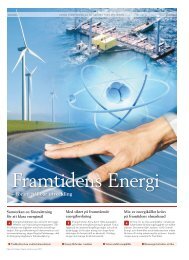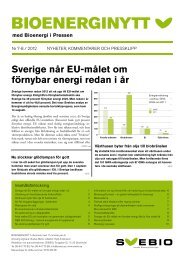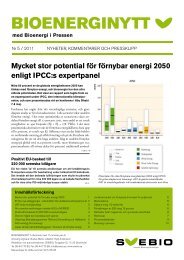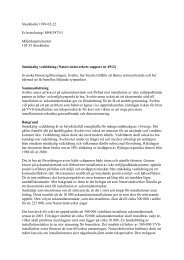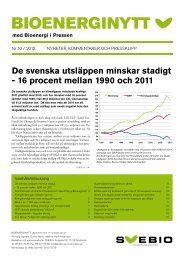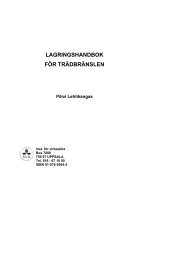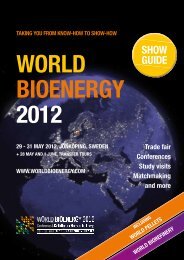Proceedings World Bioenergy 2010
Proceedings World Bioenergy 2010
Proceedings World Bioenergy 2010
You also want an ePaper? Increase the reach of your titles
YUMPU automatically turns print PDFs into web optimized ePapers that Google loves.
The State of São Paulo began to have concerns about<br />
climate change in 1995, when the PROCLIMA program<br />
(Climate Change Prevention Program) was created and<br />
the main contribution of this effort was the collaboration<br />
with the federal government in the preparation of the<br />
National Emissions Inventory (SMA, 2005) [5]; in 2002,<br />
was published the AGENDA 21, in which climate change<br />
figures as a great concern; in the same year the State<br />
government with other regional authorities started the<br />
Network of Regional Governments for Sustainable<br />
Development (NRG4SD), aiming to become a channel to<br />
share climate mitigation and other sustainable<br />
development experiences, and being the main<br />
representative in international negotiations; in 2002 also,<br />
was established a 5-year renewable licensing process for<br />
stationary sources of air pollutants, correcting the<br />
previous “right to pollute” situation of previous<br />
enterprises, demanding a gradual reduction of emissions<br />
in industries, either by technology update or shutting<br />
down facilities, effort expanded in 2004 with the<br />
approval of the Decree 48.523, that regulates the<br />
emissions of NO x, SO 2, PM 10, CO and nonmethane<br />
volatile organic compounds; just before the last COP, in<br />
2009, the government proposed also a 20% reduction on<br />
the greenhouse effect emissions until 2020 (base 2005),<br />
through the magnification of actions to the deforestation<br />
control, creation of an adaptation fund, establishment of a<br />
sustainable transportation system, mapping the<br />
vulnerabilities of the territory and financial mechanisms<br />
to the development of a low carbon economy.<br />
REI and CUNHA (2008: 7) [6] highlights that<br />
even though nation-states may remain reluctant<br />
to assume early climate change mitigation<br />
measures, thus making the international arena a<br />
complex and difficult path for the convergence<br />
of climate-friendly initiatives, there is enough<br />
space for alternative structures and approaches<br />
in both developing and developed countries.<br />
Due to its economic profile (32% of the national<br />
economic productivity), the energy consumption of São<br />
Paulo State is about 27% of the national mix (SMA, 2002<br />
[7]), been the industrial (39%) and transportation (26%)<br />
sectors the main consumers of energy. Although a great<br />
part of energy consumed by the industrial sector are<br />
produced from biomass (44% - been 36% from sugarcane<br />
bagasse), the major part of energy that moves de<br />
transportation sector comes from fossil fuels, mainly<br />
diesel (44%) (BEESP, 2005 [8]). The State participates<br />
with about 25% of Brazil’s total emissions.<br />
The projected Brazilian growth rate for the next years<br />
suggests a high increase on energy demand, thus, the<br />
need to reconsider the expansion model for the energetic<br />
matrix, a key issue regarding actions against climate<br />
change.<br />
5 FINAL CONSIDERATIONS<br />
Managing environmental issues in Brazil should be<br />
considered in national, regional and local scales. In the<br />
context of Brazilian territory, should be respected the<br />
geodynamics of landscapes and ecosystems in the<br />
proposal of candidates for Republic Presidency in <strong>2010</strong>,<br />
considering the destructive impact of capitalist economic<br />
production that has occurred throughout the country.<br />
The socio-environmental management should be the<br />
54 world bioenergy <strong>2010</strong><br />
contribution of candidates aiming to propose realistic<br />
alternatives for sustainability.<br />
At regional level, there is need to include in<br />
governance a system for accident prevention and<br />
effective monitoring of environmental conditions in<br />
selected areas.<br />
Locally, within the municipality, it is necessary an<br />
effective participation of the community and the local<br />
authorities in dealing with socio-environmental issues.<br />
A key challenge for proper governance of the<br />
environment to be implemented by the State of São Paulo<br />
is the need to consider global and local environmental<br />
aspects of ethanol production and use as an alternative to<br />
fossil fuels. To ensure the benefits of both global<br />
mitigation and local environmental quality, it is essential<br />
that government incentives a broader discussion and<br />
participation among all sectors and stakeholders,<br />
including the community enrollment.<br />
We can say that, nowadays, the environmental issue<br />
is at the center of global and national policy and thus, it is<br />
becoming a recurrent theme on the media agenda, and so,<br />
on the presidency candidates as well and overlaps others<br />
as it puts into discussion the model of civilization<br />
predatory consumerism grounded by the reproduction of<br />
capital. This discussion should promote extensive debates<br />
throughout the country that may lead to global climate<br />
change effective combat and managing social and<br />
environmental risks in the Brazilian territory.<br />
The use of the mass media as tool to drive the change<br />
in the patterns of social consumption and relationship<br />
with the environment is an expedient yet completely<br />
underused by governments around the globe.<br />
As conclusion of this paper, we highlight the lack of<br />
synchronism between the emergency in political speeches<br />
and the chronogram for public policies enforcement<br />
under national, state and municipal levels. It is necessary<br />
the creation of a social consciousness that emphasizes the<br />
need of personal engagement in combat of environmental<br />
degradation inside the communities, through the<br />
development of action projects as: solid residues<br />
recycling, environmental education, communal garden<br />
development, reforestation, riparian vegetation, among<br />
others. There cannot be any change in the society without<br />
the mobilization of the society itself.<br />
6 BIBLIOGRAPHY<br />
[1] BOYKOFF, M. T. From Convergence to Contention:<br />
United States Mass Media Representations of<br />
Anthropogenic Climate Change Science.<br />
Transactions of the Institute of British<br />
Geographers. Vol. 32, pp. 477-489, 2007.<br />
[2] MCBEAN, G. A.; HENGEVELD, H. G.<br />
Communicating the Science of Climate Change: A<br />
Mutual Challenge for Scientists and Educators.<br />
Canadian Journal of Environmental Education.<br />
Vol. 5, pp. 9-23, 2000.<br />
[3] ANDI - Agência de Notícias dos Direitos da Infância.<br />
Mudanças Climáticas na Mídia Brazileira. ANDI,<br />
2009. <br />
[4] EGLER, Cláudio Antônio G. Risco ambiental como<br />
critério de gestão do território: uma aplicação à zona<br />
costeira brasileira. Território. LAGET, UFRJ - Vol.



